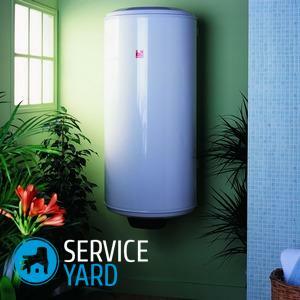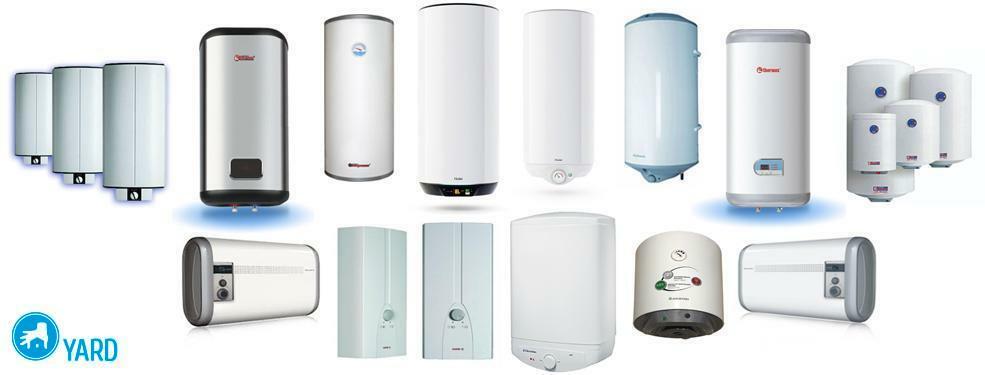
- Types of water heaters
- Cascade water heater
- Flow-through water heater
- Which water heater should I choose - flow or storage?
- What is better in terms of economy - water heater or boiler?
Today, the presence of hot water in the house is not a luxury, but a vital necessity. By and large, residents of megacities do not face the problem associated with the lack of warm water, but in villages this happens often enough. Therefore, the actual question is which water heater is flowing or cumulative, better. Since the device will be used daily, the criteria for its selection are rather stringent. To understand this, you need to know the principle of operation, all the advantages and disadvantages of both types of instruments.
to content ↑Types of water heaters
Modern electric water heaters come in two types:
- Flow;
- Cumulative.
They are perfect for both country houses and villas, and for city apartments.
Important! The devices are very popular, first of all, because of the simple installation, which does not require any documentary permits, and an acceptable cost.
Aggregates are able to completely provide the house with hot water, but differ in their design and principle of operation.
to contents ↑Storage water heater
The device is a capacity of a certain volume into which cold water is supplied from the water supply system. The tank is covered with a layer of thermal insulation.
The principle of operation of the storage heater
The device of this type works quite simply:
- The cold water that has accumulated in the tank is heated to the set temperature by the built-in electric heater, and the thermostat monitors the maintenance of the temperature chosen by the user.
- The desired temperature indicator is set manually, by turning the knobs, when it reaches the thermostat switches off the power supply of the heater.
- Due to the warming of the tank, the water retains its temperature for a long time( thermos effect).
- As soon as the water temperature starts to decrease, the thermostat automatically turns on the heating element and the water is again heated to the preset level.
- Despite the large dimensions of the tank, the storage water heater in the interior looks quite aesthetic.
Advantages of a storage water heater
Such type of water heaters are by far the most popular among consumers. And this is not strange, since the devices have undeniable advantages:
- Easy to install and connect. In order for the device to work, it is enough to have a working electrical outlet with grounding in the room.
- The ability of the unit to maintain a long time in the desired temperature mode a large volume of water - due to a well-thought-out thermal insulation of the storage tank.
- The possibility of simultaneous maintenance of several water points( for example, you can simultaneously use hot water in the kitchen and in the bathroom).
- Wide choice of design and device shapes.
Disadvantages of the storage heater
However, such heaters are not suitable for everyone. Consider the disadvantages of such a system:
- Dimensions of the device. For a family consisting of two people, for a comfortable use of warm water, a tank of at least 50-80 liters is needed. And if the family is larger, then the options for a heater with a capacity of 100 liters should be considered. Naturally, such a size tank takes up a lot of space and needs a reliable attachment.
- At the expense of the entire supply of hot water from the tank, in order to again have warm water in the house, it is necessary to wait about 15-20 minutes to heat the new one.
- This type of water heater uses electricity to maintain the required water temperature, even if you do not consume water.
- Such devices require periodic cleaning, since when water is heated to the bottom and the tank wall, precipitation of various sediments occurs, scaling is formed, which leads to a decrease in the productivity of the device.
Important! Performing preventive cleaning, it is necessary to replace the magnesium anode.
to content ↑Flow-through water heater
A flow-through boiler is another alternative hot water source that can be used both in enterprises and in apartments.
The principle of the
flow-through heater The device works on the principle different from the storage device:
- This electric heater heats the water to the desired temperature very quickly( 10-15 seconds), thanks to the presence of very powerful electric heating elements.
- Cold water comes from the water pipe, passes through the heating elements and heats up to the desired temperature.
- The flow sensors are controlled by the inclusion of the required number of heating elements. The flow increases - more elements are triggered, the flow decreases - there are fewer working TENs. This somewhat reduces the cost of electricity, which is used to heat water.
- Devices are equipped with a special protection against overheating, which, when the temperature exceeds the limit, turns off the heating elements. Thus, the risks of getting burns are excluded.
- As with cumulative models, flow protection has a protection against pressure build-up. It prevents mechanical breakdowns in the event of pressure spikes, and water boiling when the flow rate decreases through the heater.
- Modern instantaneous water heaters have an electronic type of control with display of all the necessary information. The following parameters can be displayed:
- Water temperature;
- Power of electric heating elements at the moment;
- Current flow rate( liters per minute).
- Also, flow-through type heaters can have an additional light indication that signals the water temperature has exceeded the selected value.
- A better and better running water heater is equipped with a remote control.

Advantages of a flow-through water heater
Undoubted advantages of running water heaters are:
- Possibility to use hot water without any restrictions in terms of quantity and time. The water will be heated until the consumer needs it.
- The small size of the device allows you to place it in a convenient place. Since the unit does not have a large capacity tank, it can be installed not only in the bathroom or in the boiler room, but also in the kitchen.
Important! The wall for fixing the flowing water heater does not have to choose the carrier.
- More aesthetic, when compared with storage boilers, the appearance of the device.
- Care of this unit is required minimum. It does not need to be cleaned periodically, as in the case of a storage device.
Disadvantages of the
running water heater This device has also disadvantages, which in some cases play a decisive role in the question of what is best: a boiler or a running water heater:
- The high power of the device implies a large consumption of electrical energy.
- Typically, flow units have a power from 8-10 kW to several tens, so for their installation requires the installation of reinforced cable from the access panel. It is also recommended to install automatic protection devices during installation.
Important! In an ordinary apartment outlet, you can turn on electrical appliances, the power of which does not exceed 2 kW.Before buying a flow-through water heater, make sure that the electrical network in your house allows you to connect such power to electrical appliances.
to contents ↑Which water heater to choose - flow or storage?
So, what is better - a storage or running electric water heater? Which device should I prefer - with a volumetric tank or a small but powerful device?
Here you should build on your needs, use objectives and capabilities:
- If you use the device on a case-by-case basis and anticipate a small water flow, it is better to purchase a small capacity boiler, flow or storage( up to 20 liters).
- If the water heater is to be used only during the annual water cut-off for the purpose of preventive maintenance on the water main( from 2 weeks to a month or 1-2 times a year), it is advisable to buy a capacitive heater with a tank of 50-80 liters - for 1-2 people, and a reservoir of 80-100 liters - for a larger family.
What is better in terms of economy - water heater or boiler?
In order to determine if it is more economical to use a flow-through water heater or boiler, it is necessary to take into account not only the cost of the device, but also the energy consumption during operation:
- Regarding the price of the device, the flow type units that do not have additional functions and have a capacity of up to 6 kW areinexpensively. And if we compare them with storage devices, then they win.
- If you choose more powerful flow-through water heaters with greater functionality, then their cost will be much higher than the cumulative counterparts.
Important! The cost of the storage boiler depends to a large extent on the material of the water tank, its volume, the material of the coating of the inner walls of the tank and the design of the device.
- Concerning the consumption of electrical energy, approximately the same amount is consumed to heat the same volume of water to the same temperature.
Important! There is an opinion that if there is a powerful heating element in the construction of a flow type device, the consumption of electric energy is greater than that of a cumulative heating element. However, relying on the laws of physics, we can say with confidence that this is not so. For example, to heat water with a volume of 1 liter to 100 degrees, 4200 kJ( 1.167 kW) is required, no matter how the heating is carried out.
- It is worth considering the fact that the flowing unit stops consuming electricity immediately after the valve is closed, while the storage unit, even in the "waiting" mode, continues to consume electricity while maintaining the set water temperature in the tank. Therefore, we can assume that in terms of economy, the best water heater is a flowing electric heater.
Based on the above, we can conclude:
- Although the flow type device is more economical in terms of paying utility bills for electricity, it is compact, with a low weight, but requires special skills when connecting it. Without professionals there is hardly to do.
- The storage devices are more cumbersome, they require only a reliable and strong wall for installation, and in the absence of water consumption they continue to consume electric energy.
Knowing this and taking into account the needs of your family, you can easily choose a water heater running or cumulative with the necessary parameters. What kind of running water heater is better and with respect to the quality of the boiler can be prompted by an experienced consultant in the sanitary ware shop.


